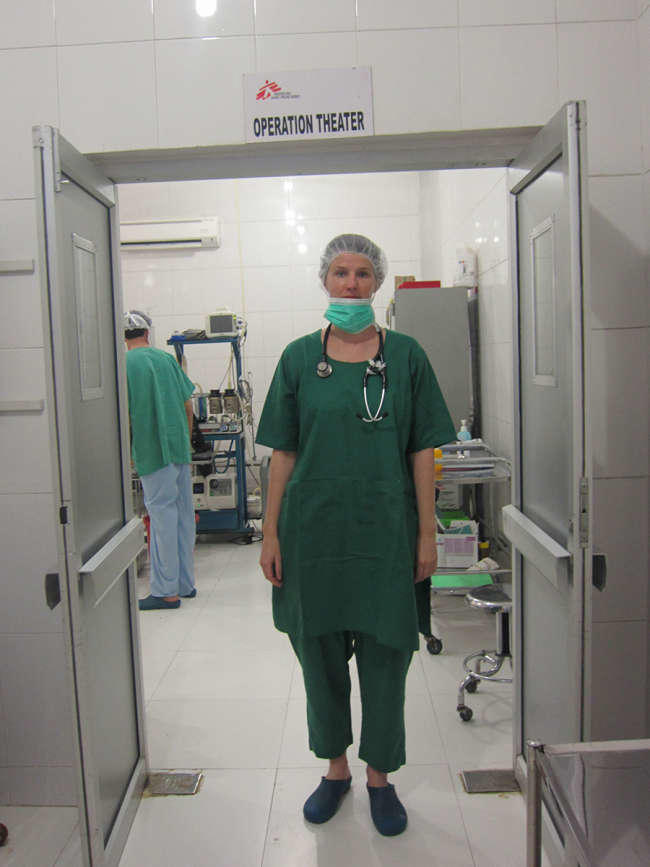Caroline is a health promotion manager currently on assignment with MSF in Pakistan. She explains how dangerous drug mis-use is threatening women's health in the area, and how she and her team are developing new (and surprisingly fun) ways to combat this...
I have been in Pakistan for about seven months. We are in the middle of summer. It is jolly hot here, hotter than my memories of summer in Rustenburg (where I worked for MSF in a sexual violence project). I’m giving time to weather in my introduction as it’s a common and useful conversation topic. As is cricket.
For someone who knows very little about cricket I’ve talked a lot about it in Pakistan. I was recently told that Hashim Amla “is a very beloved cricketer and also a very good person.” People here also seem to love Hansie Cronje, and one of the staff is commonly referred to as 'the Pakistani Jacques Kallis' due to their facial resemblance. I have been lucky, as these are the few names of cricketers that I know.
I am currently in Timergara, where MSF supports a hospital in maternal and child health (MCH) and emergency services – this means on average 900 births per month and 13,000 patients in the ER. While there are many issues related to maternal health, some of the MCH emergency cases we get are women who have received oxytocin (commonly called the ‘garm’ or ‘hot’ injection), a labour-inducing drug, before coming to our facility. Pakistani law says that oxytocin can only be used by a doctor to induce labour.
Last year MSF published research on the high rate of oxytocin misuse in this area, showing the dire consequences it can have for both mother and child. Oxytocin causes the uterus to contract, so misuse can result in the uterus bursting, maternal bleeding or asphyxia for the baby. If women come too late for assistance to our CEmONC (Comprehensive Emergency Obstetric and New Born Care) facility, their baby’s life may be in danger or they need a hysterectomy to survive. Maternal death is also a possibility.
I am not a doctor (my sister is, so my mother is often asked: “oh don’t you mean your other daughter works for MSF?”). I’m working in Health Promotion, for which oxytocin is an increasing focus in the Timergara project. Hearing of the high demand from women (and their husbands) for oxytocin and discussing birth with patients in the hospital, it seems birth is assumed to be a quick process. This could partly explain the high misuse of the drug.

All MSF projects aim to decrease mortality of the population. While the medical team does their part to respond to oxytocin misuse, the health promotion teams focuses on health education. Cultural and security restrictions limit women’s movement so we provide health promotion sessions within the hospital, explaining the complexities of birth, the importance of hospital visits before and after birth, and correct use of oxytocin.
We talk to women waiting to deliver or relatives (including husbands) waiting for a woman to deliver. This can be difficult as many are stressed, worried, in pain or simply bored. To make the most of the interaction, we focus on using participatory methods including using games (we recently adapted UNO to support messages of safe pregnancy and called it SPUNO).
The idea is that the more participation and discussion the more successful our health promotion intervention will be. We recently pre-tested a new game about maternal health (adapted from the game Dobble, so we naturally called it Mobble) with some husbands who said the interaction the game encouraged made it easier for them to talk about oxytocin.
On reflection, from the outside, a big part of medical work includes jargons and acronyms. My knowledge of these has grown since being in Pakistan. The most recent (albeit non-medical) addition being 'BMT' (big match temperament). I learnt that when discussing cricket*. Our hope is that games like SPUNO and Mobble will become part of our health promotion jargon and reinforce our health education messages aimed at safer maternal behaviour and fewer maternal and infant deaths.
P.S. We’re not sure how well SPUNO will work but are happy with the aim (and the name).
* Although I personally agree with one of the MSF drivers here who admitted to finding cricket boring, preferring eating and sleeping.




